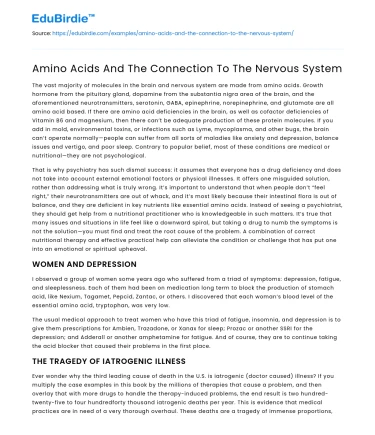The vast majority of molecules in the brain and nervous system are made from amino acids. Growth hormone from the pituitary gland, dopamine from the substantia nigra area of the brain, and the aforementioned neurotransmitters, serotonin, GABA, epinephrine, norepinephrine, and glutamate are all amino acid based. If there are amino acid deficiencies in the brain, as well as cofactor deficiencies of Vitamin B6 and magnesium, then there can’t be adequate production of these protein molecules. If you add in mold, environmental toxins, or infections such as Lyme, mycoplasma, and other bugs, the brain can’t operate normally—people can suffer from all sorts of maladies like anxiety and depression, balance issues and vertigo, and poor sleep. Contrary to popular belief, most of these conditions are medical or nutritional—they are not psychological.
That is why psychiatry has such dismal success: it assumes that everyone has a drug deficiency and does not take into account external emotional factors or physical illnesses. It offers one misguided solution, rather than addressing what is truly wrong. It’s important to understand that when people don’t “feel right,” their neurotransmitters are out of whack, and it’s most likely because their intestinal flora is out of balance, and they are deficient in key nutrients like essential amino acids. Instead of seeing a psychiatrist, they should get help from a nutritional practitioner who is knowledgeable in such matters. It’s true that many issues and situations in life feel like a downward spiral, but taking a drug to numb the symptoms is not the solution—you must find and treat the root cause of the problem. A combination of correct nutritional therapy and effective practical help can alleviate the condition or challenge that has put one into an emotional or spiritual upheaval.
Save your time!
We can take care of your essay
- Proper editing and formatting
- Free revision, title page, and bibliography
- Flexible prices and money-back guarantee
WOMEN AND DEPRESSION
I observed a group of women some years ago who suffered from a triad of symptoms: depression, fatigue, and sleeplessness. Each of them had been on medication long term to block the production of stomach acid, like Nexium, Tagamet, Pepcid, Zantac, or others. I discovered that each woman’s blood level of the essential amino acid, tryptophan, was very low.
The usual medical approach to treat women who have this triad of fatigue, insomnia, and depression is to give them prescriptions for Ambien, Trazadone, or Xanax for sleep; Prozac or another SSRI for the depression; and Adderall or another amphetamine for fatigue. And of course, they are to continue taking the acid blocker that caused their problems in the first place.
THE TRAGEDY OF IATROGENIC ILLNESS
Ever wonder why the third leading cause of death in the U.S. is iatrogenic (doctor caused) illness? If you multiply the case examples in this book by the millions of therapies that cause a problem, and then overlay that with more drugs to handle the therapy-induced problems, the end result is two hundred-twenty-five to four hundredforty thousand iatrogenic deaths per year. This is evidence that medical practices are in need of a very thorough overhaul. These deaths are a tragedy of immense proportions, hiding behind the veil of “the best medicine in the world.”
The University of San Diego reports expenses resulting from medication failures and medication-related issues totaling $495 to $672 billion per year. In addition to this unnecessary expense, there are also an estimated 275,689 deaths per year,21 and Psychology Today reports that when doctors go on strike, patient death rates can actually decrease!
To further put this into perspective, imagine that these hundreds of thousands of deaths were the result of something else, like plane crashes. If three large aircrafts carrying two hundred-twenty-five people each crashed on a daily basis all year long, you probably wouldn’t be so quick to board an airplane. The risk is just as great when taking unnecessary prescription medications or submitting to questionable surgeries, yet most people don’t hesitate to put drugs in their bodies or go under the knife.
So, what exactly was going on with these women? Since you’re this far into the book, I’m sure you’ve got the sequence figured out:
- Stomach acid-blocking medications blocked the digestion of dietary proteins and the absorption of minerals, like magnesium.
- Dietary proteins are the source of tryptophan, but since digestion was compromised, tryptophan and other amino acids were not well absorbed. Therefore, their blood levels of tryptophan were low, leading to low levels in the cells.
- Magnesium and vitamin B6 are needed to make tryptophan into proteins, but they also require stomach acid. Blocking the acid further compromised protein synthesis.
- Tryptophan is the parent molecule for niacin. Inadequate tryptophan means inadequate niacin, so the cells couldn’t make energy. This led to the women having fatigue.
- Tryptophan is also the parent molecule for melatonin. Since there was inadequate melatonin in their bodies, they couldn’t sleep well.
- Tryptophan is also the parent molecule for serotonin. Low serotonin meant that the ladies were apt to suffer from depression and other mood problems.
These women were fatigued, sleepless, and depressed due to the long-term use of drugs that blocked stomach acid. This was not entirely their own doing—their doctors had dutifully renewed their prescriptions despite the warning in the Physician’s Desk Reference that these drugs were for short term use only. This observation led to a very simple solution: We gave them stomach acid supplements containing pancreatic enzymes so they could digest proteins, weaned them off their acid blockers, and gave them essential amino acids with extra tryptophan, B6, B complex, and magnesium. Their fatigue, depression, and sleeplessness all resolved within a few months time. Good detective work combined with nutritional medicine can solve health problems—it’s modern medicine at its best!






 Stuck on your essay?
Stuck on your essay?

